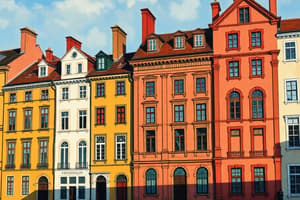Podcast
Questions and Answers
Who co-founded the Society for the Protection of Ancient Buildings (SPAB)?
Who co-founded the Society for the Protection of Ancient Buildings (SPAB)?
- Oscar Wilde
- John Ruskin
- Charles Dickens
- William Morris (correct)
Building conservation is an ancient concept that has been practiced for centuries.
Building conservation is an ancient concept that has been practiced for centuries.
False (B)
What emotion do people often feel towards historic buildings according to the speaker?
What emotion do people often feel towards historic buildings according to the speaker?
profound emotional connection
Building conservation emerged in response to inappropriate __________ methods employed by the Victorians.
Building conservation emerged in response to inappropriate __________ methods employed by the Victorians.
Match the following concepts with their descriptions:
Match the following concepts with their descriptions:
Which of these principles is emphasized in the SPAB manifesto?
Which of these principles is emphasized in the SPAB manifesto?
Conserved buildings can help revitalize local economies.
Conserved buildings can help revitalize local economies.
What does the speaker believe is crucial for conservation specialists when working with buildings?
What does the speaker believe is crucial for conservation specialists when working with buildings?
The conservation process involves both repair and __________.
The conservation process involves both repair and __________.
How does conservation contribute to sustainability?
How does conservation contribute to sustainability?
Flashcards
Building Conservation
Building Conservation
A movement that emerged in the late 1800s, aiming to preserve historical buildings while respecting their original character and adapting them for present-day use.
SPAB (Society for the Protection of Ancient Buildings)
SPAB (Society for the Protection of Ancient Buildings)
The Society for the Protection of Ancient Buildings, founded in 1877, played a crucial role in shaping the principles of building conservation.
What skills do conservation specialists need?
What skills do conservation specialists need?
Building conservation specialist must possess both technical expertise and a sensitive approach, considering both old and new materials, construction techniques, and the building's history.
Why is humility important in building conservation?
Why is humility important in building conservation?
Signup and view all the flashcards
Is conservation just about repair?
Is conservation just about repair?
Signup and view all the flashcards
The craftsman's connection to materials.
The craftsman's connection to materials.
Signup and view all the flashcards
Impact of conservation on communities.
Impact of conservation on communities.
Signup and view all the flashcards
Economic benefits of conservation.
Economic benefits of conservation.
Signup and view all the flashcards
Connection between conservation and sustainability.
Connection between conservation and sustainability.
Signup and view all the flashcards
What does the speaker's experience with Union Chapel illustrate?
What does the speaker's experience with Union Chapel illustrate?
Signup and view all the flashcards
Study Notes
Building Conservation
- Building conservation is a relatively new concept, originating in the late 1800s.
- It arose in response to the often-inappropriate restoration methods used during the Victorian era.
- William Morris, a key figure, co-founded the Society for the Protection of Ancient Buildings (SPAB) in 1877.
- The SPAB's manifesto outlined conservation principles, aiming to preserve historical buildings for future generations.
- These principles prioritize preserving the unique character of historical buildings, learning from past practices and adapting them for future use.
Importance of Building Conservation
- Historic buildings evoke a deep emotional connection for many people.
- They embody the stories and craftsmanship of generations.
- The speaker's experience with Union Chapel highlights the sense of calm and inspiration inspired by the building's history.
Skillset for Building Conservation
- Conservation specialists require technical expertise and a sensitive approach.
- Proficiency in both old and new materials, as well as the history and construction methods of the specific building, is essential.
- Humility is paramount, recognizing buildings as products of previous choices and respecting the impact of the past.
Conservation as a Craft
- Conservation involves both repair and creation.
- It entails repairing existing features, integrating new elements, and achieving an aesthetically cohesive result.
- The craftsman's connection to the materials' texture, sound, and patina adds depth to the process.
Community Impact of Conservation
- Conserved buildings create a sense of place within communities, connecting people to their history.
- They foster shared history, cultural activity, and community feeling.
- Conservation projects can stimulate local economies, attract tourism, and provide employment opportunities.
Sustainability and Conservation
- Conservation and sustainability are interconnected.
- Maintaining existing structures reduces the need for new materials and minimizes environmental impact.
- This approach contributes to environmental and community sustainability.
Conservation as a Shared Responsibility
- Conservation is a collective responsibility.
- It's crucial to safeguard heritage for future generations.
- Initiatives like those offered by the SPAB and the Prince's Foundation nurture the next generation of conservation professionals.
- Promoting awareness through workshops, exhibitions, and community engagement broadens participation in heritage preservation.
Studying That Suits You
Use AI to generate personalized quizzes and flashcards to suit your learning preferences.




